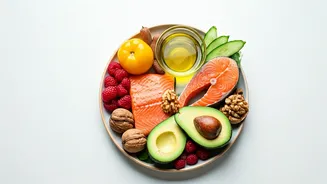HDL Cholesterol Explained
HDL cholesterol is often regarded as 'good' cholesterol due to its role in removing other forms of cholesterol from your arteries, thus lowering the risk
of heart disease. Higher levels of HDL are generally considered beneficial, while lower levels are associated with increased cardiovascular risk. This protective action is crucial because high levels of LDL cholesterol, the 'bad' cholesterol, can lead to plaque buildup in arteries, contributing to conditions like atherosclerosis. Maintaining a balanced diet rich in heart-healthy foods is a proactive way to promote higher HDL levels and overall cardiovascular health. This proactive approach supports the body's natural processes in safeguarding against heart-related ailments.
Olive Oil's Heart Benefits
Extra virgin olive oil, a staple of the Mediterranean diet, is packed with monounsaturated fats. These fats are linked to increased HDL cholesterol levels and are also known for their anti-inflammatory properties, providing additional heart health benefits. Using olive oil in cooking, drizzling it over salads, or incorporating it into dips are simple ways to enjoy its goodness. Consistent use of olive oil can contribute to improving the lipid profile, reducing the chances of developing heart disease and supporting overall cardiovascular well-being. It is recommended to choose extra virgin olive oil for the highest concentration of beneficial compounds and flavor.
Fatty Fish and Omega-3s
Fatty fish, such as salmon, mackerel, and sardines, are excellent sources of omega-3 fatty acids, which are highly regarded for their ability to raise HDL cholesterol. Omega-3s also possess anti-inflammatory qualities and can reduce triglycerides, which are another type of fat in your blood that can elevate the risk of heart disease. Consuming fish a couple of times a week provides significant health benefits, helping to maintain healthy cholesterol levels. Consider baking, grilling, or steaming the fish to preserve its nutritional value. Incorporating these into your meal plan provides a tasty way to improve heart health.
Avocados: Nutrient Powerhouse
Avocados, rich in monounsaturated fats, contribute positively to HDL cholesterol levels. These creamy fruits also provide fiber, vitamins, and minerals that promote overall health. Including avocados in your diet by adding them to salads, sandwiches, or smoothies can enhance heart health. The healthy fats present in avocados help reduce LDL cholesterol and improve your HDL cholesterol, helping the overall lipid profile. Furthermore, the combination of monounsaturated fats and dietary fiber makes avocados a powerful heart-healthy food.
Nuts and Seeds for HDL
Nuts and seeds, such as almonds, walnuts, chia seeds, and flaxseeds, are packed with healthy fats, fiber, and other nutrients that aid in increasing HDL cholesterol levels. These foods are also a great source of protein and antioxidants. Eating a handful of nuts or seeds as a snack or adding them to your meals offers a quick and easy way to support your heart health. Consuming nuts and seeds regularly helps in reducing inflammation and improving cholesterol levels. Variety is key, so include a mix of different nuts and seeds in your diet to maximize the benefits.
High-Fiber Foods' Impact
Foods high in soluble fiber, like oats, barley, and beans, can help lower LDL cholesterol and indirectly support HDL cholesterol levels. Fiber aids in removing cholesterol from the body and promotes better overall cardiovascular health. Incorporate these into your diet through oatmeal for breakfast, adding beans to soups and salads, or choosing whole-grain options. This will support healthy digestion and improve lipid profiles. Making sure you have enough fiber in your diet is a good approach to support your heart's well-being.
Soy Products and HDL
Soy products, such as tofu, tempeh, and edamame, are a source of protein and contain compounds that can help improve cholesterol levels, specifically by increasing HDL cholesterol. Replacing some animal-based protein with soy products can contribute to reducing LDL cholesterol, further supporting overall heart health. Try incorporating soy into meals by using tofu in stir-fries, adding edamame to salads, or using soy milk in your cereal. This is a beneficial way to boost HDL cholesterol and improve cardiovascular well-being.













